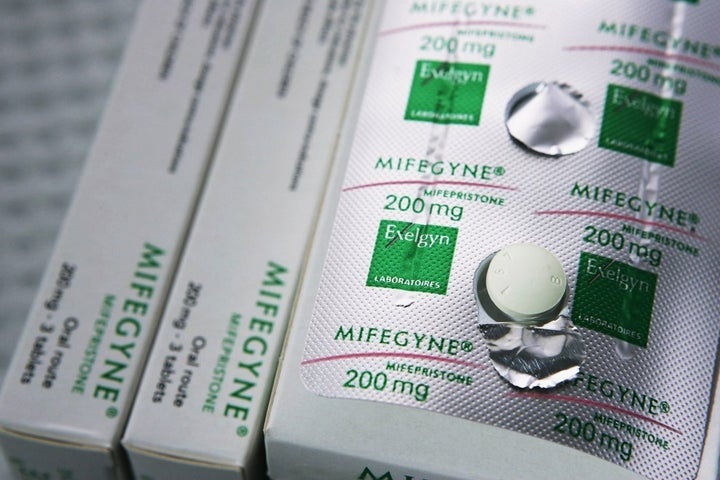[ad_1]

Phil Walter / Getty Images
Indiana lawmakers passed a bill on Monday that would make doctors tell women about “abortion pill reversal,” a procedure that has come under fire by doctors and scientists for relying on almost no evidence.
Still awaiting a final vote from the state senate, the bill is only the latest in a series of laws mandating that doctors talk about the experimental therapy, now on the books in two other states, and up for consideration in two more. The procedure — meant to continue a pregnancy after a woman has started taking the “abortion pill”, mifepristone — has only been described in a single published study from 2012. That study described six women who underwent the treatment.
“This is for those who take that first step and regret it,” Indiana representative Peggy Mayfield, who co-authored the bill, told The Indianapolis Star. “There is an alternative there. There is hope.”
Doctors and medical groups, however, call politicians dictating medical care dangerous.
“It’s very concerning that legislatures would be forcing doctors to say anything to a patient, but particularly forcing them to give information about a treatment that is completely unproven,” Daniel Grossman, a professor in the department of obstetrics, gynecology and reproductive sciences at the University of California at San Francisco, told BuzzFeed News. “This is a dangerous intrusion into the doctor-patient relationship.”
Since 2015, similar laws have been put into place in Arkansas and South Dakota, and Utah and North Carolina are currently weighing their own abortion reversal bills. In Arizona, which also passed an abortion reversal law in 2015, the law was repealed last year after a court challenge from Planned Parenthood, which called the bill “bad medicine and government interference at its worst.”
“Politicians are forcing medical professionals to read scripts that do not necessarily comport with their beliefs or their medical opinions of what will be the best treatment and in the best interest of their patients,” Jill Adams, executive director of the Center on Reproductive Rights and Justice at UC Berkeley, told BuzzFeed News.
“This is yet another step on a path that abortion opponents have been walking and forcing abortion providers to walk for many years now.”
Since it was approved in 2000, 2.8 million women have had medical abortions in the US. That procedure involves taking a 200-milligram dose of a drug called mifepristone, also known as RU486, in the first 63 days of their pregnancy. A day and a half to three days later, they take a second drug called misoprostol, which opens up the cervix and causes the contractions of the uterus that expel the pregnancy.
Developed to offer women an option that was easier than surgery, the abortion pill gave women the ability to end a pregnancy in their own homes. Medication abortion now accounts for nearly one-third of all abortions performed in the US.
The abortion reversal process was first described in 2012 in a single study by George Delgado of the Culture of Life Family Services clinic in San Diego, California. The protocol involves injecting women who have changed their mind about an abortion after the first dose of mifepristone with weekly doses of progesterone through the 12th week of pregnancy. Delgado’s 2012 study claimed that four out of six women who underwent the treatment brought their pregnancies to term.
Off that one study, Delgado has since trained a network of over 400 doctors in all 50 states to treat roughly 600 patients, with about a 56% to 60% birth rate in their pregnancies, said Debbie Bradel, nurse manager at Delgado’s Abortion Pill Reversal group.
Bradel noted that while Abortion Pill Reversal is not directly involved in the new spate of laws requiring doctors to counsel patients about the procedure, several of the doctors in their network testified in favor of the Indiana bill.
“We need plenty of doctors ready and available to provide the service,” Bradel said. “While they’re scrambling to get legislation, we’re struggling to get providers set up everywhere. We’re small, we don’t have a lot of workers, so we have a lot of work.”
The American College of Obstetrics and Gynecology, however, has flatly denounced the abortion reversal procedure, saying that it is “not supported by the body of scientific evidence.” They argued that the 2012 study itself was severely flawed: The women received varying doses of the progesterone, and there was no control group to show that the regimen was any more effective than taking mifepristone without the second dose on its own, which they explained leads to a continued pregnancy in 30 to 50% of women.
Delgado’s study was also not overseen by an institutional review board or an ethical review committee, ACOG argued, as is required for most scientific research.
But arguments about the efficacy of the treatment* obscure the actual point of the “abortion reversal” laws, Adams said: They are meant to instill uncertainty at all costs in women who have already made informed decisions about their medical treatment.
“The reality is that it’s incredibly rare that a woman changes her mind after starting a medication abortion,” said Grossman. In a 2015 paper analyzing evidence for the abortion pill reversal procedure, Grossman looked into required reports from the manufacturer of mifepristone of pregnancies that were not terminated, finding that just 0.004% of medication abortions prescribed between 2000 to 2012 ended in pregnancies.
“People make informed decisions in their own pregnancies,” said Adams. “They don’t need more time, they don’t need ultrasounds, they don’t need lies about health risks, and they don’t need outs like this to save them from their own decisions. They need safe, reliable healthcare that is private.”
The Indiana bill now heads to the Senate, which skews Republican 41 to 9 in the conservative state, for a vote by April 6th.
LINK: Here’s How Abortion Is Actually Practiced In The United States
LINK: New Abortion Pamphlet In Texas Pushes False Health Risks, Experts Warn
[ad_2]
